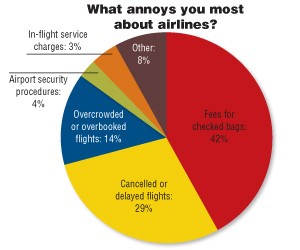Every week it seems there’s some story about an airplane trip that went horribly wrong. A plane is stuck on the tarmac for hours, its seats filled to the brim with crying babies and hot, thirsty passengers desperate to escape. A veteran flight attendant goes ballistic, curses at passengers and then makes a hasty exit down the emergency shoot.
Then there are the everyday annoyances that don’t make the news. The mad scramble among boarding passengers—determined to not pay the checked baggage fee—jamming their bulging carry-ons into crowded overhead bins. The onboard charges for everything from pillows to peanuts. The cancelled and delayed flights, resulting in endless hours in the terminal. The airport security procedures that seem only to inconvenience the innocent masses rather than foil actual terrorists.
While usually not as fraught with frustration, the hotel portion of a trip can send blood pressure climbing as well. Unhelpful staff, $5 sodas in the minibar and irksome resort fees tacked onto the room bill are also part of what makes time on the road an ordeal.
Since meeting planners do a fair amount of business travel, as well as orchestrate it for others, Meetings Media wanted to find out what our readers are enduring when making the increasingly stressful journey from Point A to Point B. In a poll of a cross-section of our readers, 368 planners ranked their biggest gripes about airlines and hotels, while many also took time to comment (quite heatedly, at times) on their recent travel experiences.
Airline Gripes
When it comes to airline travel, planners most often cited fees for checked bags as their biggest annoyance (42 percent), followed by cancelled or delayed flights (29 percent) and overcrowded or overbooked flights (14 percent). In-flight service charges (3 percent) and airport security procedures (4 percent) were ranked quite a bit lower—although planners’ comments indicate that these are not petty grievances either.
“In airline travel, those ALL annoy me,” stated one planner. “What really annoys me are delayed flights due to all the carry-ons people bring because of the fees for checked baggage. The thousand fees popping up as a la carte fees that were once included is extremely annoying.”
Another planner asserted that fees for checked luggage are especially irksome for those attending business meetings.
“The fee for checked bags is the biggest hindrance to business travel for many of my colleagues,” the planner commented. “We do not hold one-day meetings, and appropriate business attire is required, which means more clothes to pack. We are being held hostage as the airlines know most people using their service will need luggage. Even if they only charged for the second bag, I would understand, but now we’re down to charges for carry-ons. It’s out of control.”
Some respondents took note of the stressful atmosphere created by passengers trying to fit their carry-ons into overcrowded bins, a situation widely believed to have sparked the highly publicized meltdown of JetBlue flight attendant Steve Slater last month.
“No wonder the JetBlue flight attendant finally blew a gasket—I can feel his pain,” one reader commented.
While acknowledging stressful working conditions, many poll respondents voiced resentment of the treatment they are receiving these days from both airline and airport security staff.
“Just about every aspect of travel in the United States is difficult—from rude or inattentive TSA workers to disorganized operations at some airports,” a planner lamented. “Airlines are not helping the problem. With the exception of Southwest Airlines, most of the staff have been jacked around so much by their employers that they can’t help to come to work with an attitude. I would too if I made less today than I did 10 years ago.”
With airlines shedding unprofitable routes and making service cuts to maximize load factors, many respondents complained that cancelled, eliminated and overbooked flights are increasingly turning business trips into lengthy ordeals.
One planner noted that flight and route eliminations are “making it very difficult to get to some cities without a huge amount of waiting or really terrible connections. The flights that made travel more reasonable and efficient seem to be gone.”
For another planner, the widespread reduction in air service often means “traveling a day earlier than was previously necessary to accommodate conference preparation.”
For another, flight cancellations on recent trips “have resulted in either an overnight stay or me demanding a transfer to another airline, in order to avoid a cancellation.”
By making fewer flight choices available, one frustrated planner declares the airlines have reduced competition and thus have “created a captive market…which eliminates any incentive for them operating any differently.
“The only part of my experience that the air carriers care about is how often and how much they can take out of my wallet,” the planner continued. “I just leave my wallet open now, because once I am required to fly, the air carriers know that they can take as much as they want because I’m stuck.”
While air travel is often an unavoidable part of a meeting, some planners are so frustrated with airline service that they are exploring alternative forms of transportation.
“The airlines are so disgusting, I drive everywhere I need to go in my seven-state region,” an independent planner commented. “I just hate to furnish air travel for a group of ‘winners’ that my clients want to reward for their extra efforts and then get repeated reports of the way the airlines treat them. We’re exploring rail travel to all domestic destinations.”
Hotel Gripes
When it comes to hotel gripes, rude or unhelpful staff topped the list (48 percent), followed by in-room Internet charges (27 percent) and resort fees (18 percent).
In their comments, many planners bemoaned what they see as a declining level of customer service on the part of hotels as well as airlines.
One planner went as far as to say, “Today the word ‘customer service’ does not exist. No longer do hotels and airlines look at their business as a service industry, which is exactly what it is. True customer service lacks across the board when it comes to these industries.”
Another observed that “it is always surprising to me that in this economy, the level of customer service seems to continue on a downward spiral. I realize everyone is doing more with less, but that shouldn’t make you rude.”
Internet charges, resort fees and other charges tacked on to the hotel rate drew only negative comments from the respondents.
“The hotel resort fee has always boggled my mind,” a planner stated. “For goodness sakes, it should be included in your room rate because it’s not an option—it’s mandatory! You can’t opt out of the resort fee, but you can opt to use the Internet or mini-bar.”
Along with forcing guests to “pay for services and amenities you may not even use,” one planner observed that resort fees “also call attention to the fact you stayed at a resort on your expense report.”
In general, whether commenting on hotels or airlines, many planners just seemed resigned to the fact that travel is more of a travail than it used to be. As one put it:
“Let’s face it, there’s nothing glamorous about business travel. For those on the road a lot, we’ve learned how to make it more tolerable, but until they make the seats bigger, give you a bottle of water and act like they care that you are there, it’s just another way to get to work.”




